Too simple and childish for adults, and too one-note to convert the kids, Lego Horizon Adventures does little to recommend it to either existing Horizon fans or series newcomers.
When you think of Lego games, chances are your brain will go straight to one of the licensed Traveller’s Tales games from the last 20 years or so. Whether it’s Star Wars, Batman or Indiana Jones, there’s no denying their joyful cycles of wild and wilful destruction, clackety building and reams upon reams of daft jokes over the years have come to define what we expect and want from any new licensed Lego adaptation. And I think it’s important to state up front that Lego Horizon Adventures, which retells the story of Sony’s Horizon Zero Dawn for a fresh and younger kind of audience, is not that kind of Lego game.
Lego Horizon Adventures review
- Developer: Guerrilla Games, Studio Gobo
- Publisher: Sony Interactive Entertainment
- Platform: Played on PS5
- Availability: Out on 14th November on PC (Steam), PS5 and Nintendo Switch
To put it another way, if the Traveller’s Tales Lego games were about bulldozing recognisable film sets with a maniacal grin on your face, Lego Horizon Adventures is more like playing with perfectly glued down figure sets at a friend’s house that you’re almost too scared to touch in case they might break. It is, in effect (to pull from the game’s other main touch point) a bit like playing in Will Ferrell’s basement from The Lego Movie – and not just because its cast of characters move in that same, almost stop-motion kind of way during cutscenes, or have a similar tendency to talk a mile-a-minute in its overwritten and hyperactive script. Sure, you can trundle Aloy, Varl, Erend and Teersa along and pretend to go ‘pew pew!’ or ‘boom!’ as you play out mock battles either by yourself or with a friend, but for goodness’ sake, don’t break anything will you?
Of course, I’m acutely aware that I should be talking about Lego Horizon Adventures on its own merits, rather than simply lamenting how its dearth of good visual gags and shocking lack of destructible scene furniture don’t necessarily correlate to the template laid down by the work of an entirely different developer. But even if you put aside all previous notions of what Lego games can or should be, Lego Horizon Adventures still struggles to answer one fundamental question: who the heck is this game even for?
I’m not convinced it has much to offer existing, adult Horizon fans, for example (or any children they’re likely hoping to indoctrinate with it either), as the way it simplifies and recalibrates the story of Zero Dawn to be told across a swift, seven-hour campaign means there’s very little left to hold on to in terms of nostalgia bait, or even to point at fondly saying, ‘Ah, remember that bit? Wasn’t that great?’ The same core building blocks are all present and correct – Aloy and friends must work together to stop evil sun worshipper Helis and the rogue AI turning all the world’s machine beasts into human-munching death traps – but when the thrust of the main story is focused around collecting three metal flowers and little else, the Horizon you know and love becomes harder and harder to recognise outside of its tentpole machine battles.



The cast’s new zany personalities are a mixed bag, too. I’m all for Aloy having a sense of humour, but her new obsession with pickled sandwiches fell completely flat for me, as did Erend, whose entire personality has been reshaped to only care about donuts now. Do general foodstuffs count as high comedy these days? Lovable idiot Varl and sassy, bomb-chucking grandma Teersa land slightly better, but a lot of it is still a bit too try-hard for its own good. Besides, even if you do end up liking some more than others, all of them talk far too much during missions, quipping left, right and centre in frothing, overexcited soundbites that will quickly wear you down regardless of who you gravitate towards.
Not that it really matters who you or your local co-op partner play as here, as there’s precious little to distinguish its central quartet. Everyone has a serviceable short- and long-range attack based on how long you hold down the attack button, and there aren’t any character-specific abilities to worry about when it comes to rinsing each level for extra studs to spend back at your base camp in Mother’s Heart. In fact, the only obstacles you’ll come across in the game are burnable vines (which everyone can ignite by firing their weapon through an always-nearby fire pit), and walls of ice (which, again, everyone can smash with whatever they have to hand). The secondary gadgets are all universal as well, and even the handful of unique character weapons you’ll come across via the mid-level trader caravan mostly boil down to the same kinds of variants for all four cast members – there’ll be one that sets things on fire, another to freeze enemies in place, while others will shock them with jolts of electricity. It all feels very one-note, and it’s a feeling that’s sadly reinforced by the game’s repetitive mission structure.




Even though levels are spread across four different biomes (with one even dipping its toes into the icy mountains of Horizon’s Frozen Wilds DLC, while another riffs on the more tropical climes of Horizon’s sequel Forbidden West for seemingly for no other reason than the sake of some tonal variety), each mission follows the same basic template. The bones of them will be instantly familiar to anyone who’s spent any time playing Hades or other roguelikes, as despite not being procedurally generated in their construction, they are all split into distinct rooms and break points that lightly remix the same handful of ruins, paths and combat arenas every time you set off toward that biome from your Mother’s Heart home hub.
You’ll always begin following trails of studs down some linear corridors with a bit of gentle platforming in tow, until you reach one of its large, circular battle arenas full of long grass and nasty machines to beat up. Then, once the battle is over, you’re funnelled back into tunnels of stud-collecting again until the next big battle sequence. Rinse and repeat for seven hours, with the occasional, once-per-biome break to chase the area’s single Tall Neck (a rare highlight) or punch through a tech-filled Cauldron factory.

Indeed, it’s little wonder that Lego Horizon Adventures doesn’t let you replay levels once you’ve completed them, as there’s simply no reason to return to them once they’re finished. There are no collectibles or special bricks to sniff out, either through skill or investigation, as they’re all just handed to you at the end of each level, and the few stud caches there are to find off the beaten, very well-signposted track are usually so meagre that I quickly stopped bothering to seek them out after a while.
Heck, even the sporadic clumps of bricks you can find to construct extra bits of scenery ended up being disappointing as well. The objects themselves aren’t just overused and totally non-interactive once they’re made up, they’re also overly simple to build – can you even call it ‘building’, when all it takes is a single button tap to do the job? It’s tiny details like this that make it feel like co-developers Guerrilla Games and Studio Gobo are often guessing at what makes a good Lego game a lot of the time, even when there are ample and obvious examples to pull from elsewhere.



With the platforming so plodding and lethargic, the focus of Lego Horizon Adventures falls entirely on its combat – which is definitely where it shines the brightest, but where it might also come the most unstuck for younger fingers and thumbs. On the face of things, it’s a pretty good translation of Horizon’s action-packed fights. The machine beasts are all wonderfully recognisable and represented in their new blocky counterparts, and manoeuvring your character to attack their sides and rear to target weak points and highlighted bits of machinery gives fights a real sense of pep and challenge. Especially so once you start factoring in their big, red area of attack circles and other environmental hazards eating up the available play space. The introduction of a new machine always feels like a big event, too, and likewise the game paces out its big reveals to provide a steady stream of ever-more aggressive adversaries, so you’re never left fighting the same combination of enemies for very long.
Thankfully, aiming is pretty generous considering how much carnage there can be unfolding on screen sometimes. You’ll hit an available weak spot as long as you’re facing in roughly the right direction with a clear line of sight, though twin-stick controls are also on hand to provide a finer degree of control should you need it. Taken altogether, it’s pretty exhilarating stuff, and it’s made all the more fun and chaotic by your limited pool of gadgets and special weapon uses. It redeems what would otherwise be a dreary march through Zero Dawn’s reconfigured story beats, though whether smaller hands will be able to keep up with it all is another matter entirely. Having no children of my own to act as willing test subjects on this front, I can’t really say one way or the other. Health-providing berry bushes are liberally scattered around each battle arena to help take some of the edge off, sure, but to me at least, its reliance on targeting weak spots and getting yourself into the right position isn’t nearly as kid-friendly as, say, holding down X to shoot everything in sight in a matter of seconds.

Lego Horizons Adventures accessibility options
Settings to tweak HUD scale, font size, subtitle background opacity. On/off toggles for subtitles, repeated button presses, replacing button holds with single taps, colour blindness modes (with accompanying correction strength options). Different aiming modes and throwing sensitivity settings. Obstacle speed options. Separate sliders for overall, music, dialogue, effects and background volume. Stick dead zone options and rebindable key/controller buttons. Multiple text and audio languages. Five difficulty settings.
Which brings me back to my question of ‘who is this game really for?’ It just doesn’t seem calibrated for truly tiny players who want another slapstick Lego game to stick in their gob, and nor is it interesting or exciting enough for seasoned Horizon fans to get much of a kick out of, either. The studs you accumulate can only be spent on more costumes for Aloy, Varl, Erend and Teersa, but is the game made funnier by dressing them up in a blue spacesuit, hot dog outfit, or a Ninjago cosplay? Not really. And why am I spending studs adding City or Amusement Lego paraphernalia to cabins and huts in Mother’s Heart? Why is that an option? Is this just a ploy to attract any old Lego fan? It’s such a bizarre hodgepodge of stuff thrown together in one big messy basket. None of it really clicks to form a cohesive, memorable whole.
It’s such a shame, as the rest of Lego Horizon Adventures is frequently gorgeous. Each environment looks like a proper handmade Lego set, with the kind of scratches, dents and lighting effects that make it feel every bit as pretty and lived in as the actual Lego Movie. But every time I can only bash in one of three available destructible items in any given area, I’m reminded that, yes, I am actually in The Lego Movie, and I’m stuck inside Will Ferrell’s lifeless Lego diorama den again. It’s a decidedly joyless kind of game, the sort that’s better to look at than actually play with, and one that does little to bridge the gap between its two main subjects. I still don’t know why it exists or who it’s for, and there’s little evidence to suggest that Guerrilla or Gobo know the answer either.
A copy of Lego Horizon Adventures was provided for review by Sony Interactive Entertainment.
fbq('init', '560747571485047');
fbq('track', 'PageView'); window.facebookPixelsDone = true;
window.dispatchEvent(new Event('BrockmanFacebookPixelsEnabled')); }
window.addEventListener('BrockmanTargetingCookiesAllowed', appendFacebookPixels);

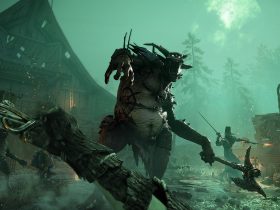

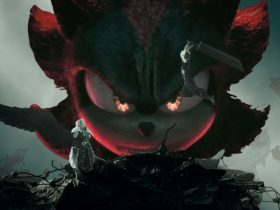
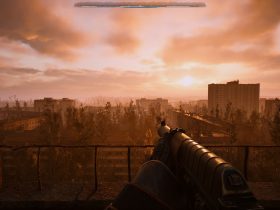
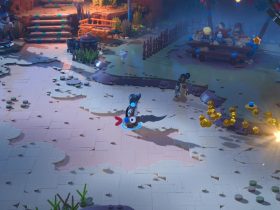

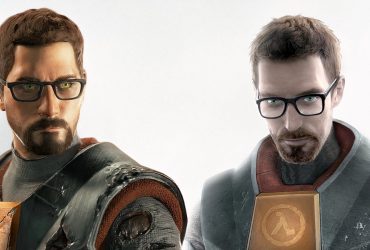
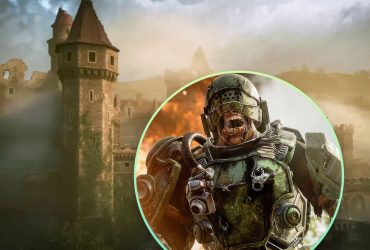
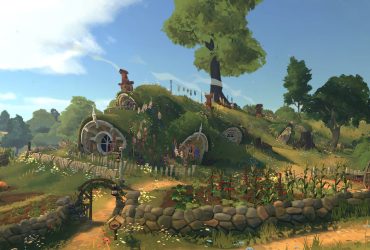


Leave a Reply